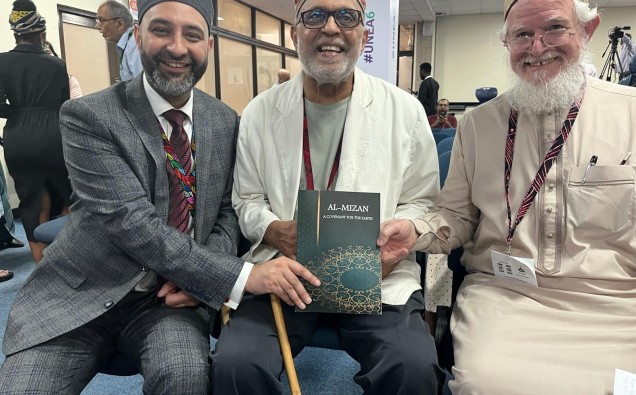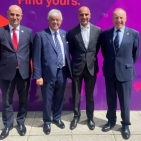A leading green charity in Birmingham has played a central part in a new charter, that sets out an Islamic outlook on responsibility for the environment and tackling climate change. Al-Mizan – which means “balance” – was launched on 27th February in Nairobi at an event alongside the UN Environment Assembly (UNEA-6).
The Covenant – seen as an equivalent to Pope Francis’s Laudato Si document on environmentalism and faith – urges collective action on the triple threat of a changing climate, biodiversity loss and pollution. It draws on theological and ethical principles to outline a path to a more sustainable future.
Al-Mizan has been produced by a large international group of Muslim eco-theologians and scholars with extensive experience in faith-based environmental and climate work. The initiative has been led by the Birmingham-based Islamic Foundation for Ecology and Environmental Sciences (IFEES).
Sitting on both the project’s Core Team and Scholars’ Drafting Team is Fazlun Khalid, who established IFEES in the early 1990s. A pioneering campaigner and author, Khalid’s achievements include working with fishermen in Zanzibar to stop them dynamiting coral reefs, and ahead of the 2015 Paris Agreement, drafting the Islamic Declaration on Climate Change, which backed a 100% switch to renewable energy and support for communities impacted by climate disasters.
Khalid’s co-author and mentee Kamran Shezad, who lives in Birmingham, is current Director of IFEES and Sustainability Lead for Balsall Heath-based educational charity the Bahu. Shezad is grassroots environment and social justice campaigner who has produced toolkits and how-to guides. He has had advisory roles to the COP26 Presidency and the UN Environment Programme and was recently picked for the Multifaith Advisory Council to the UN Interagency Task Force on Religion and Sustainable Development.
Shezad says that Al-Mizan is not a generic theological document, but goes further, diving into real ethical dilemmas. “It does not shy away from thorny issues such as human population growth, the insatiable global economic system, how we produce and harvest food, genetically modified organisms, the loss of wildlands and wilderness, the lack of ecological literacy in our educational institutions,” he says.
“The authors do not set out to tell Muslims or non-Muslims what to believe, but to raise questions and challenge them to seek solutions within the context of Islamic values and teachings.
In Birmingham, Shezad says, “we have seen faith communities step up during crises like the pandemic and the cost of living crisis, and the environmental crisis we are facing is no different.
Fazlun Khalid describes Al-Mizan “as a guiding light, inspired by faith and fuelled by responsibility”. He has written that “the ethos of Islam is that it integrates belief with a code of conduct which pays heed to the natural world. Islam proves a holistic approach to existence… I was hardly able to find a page in the Quran that did not mention the cosmos, or the Earth, or the sentient beings that thrived in it, and numerous other aspects of the natural world”.
At the launch, lead author of Al-Mizan, Saudi Arabia-based researcher and ecological planner Othman Llewellyn told the audience: “Even when I hear a call for good for all humanity, I cringe – because it aims at less than for the good of all beings”.
President of the UN Environment Assembly Leila Benali, who is Morocco’s Minister of Energy said: “Morocco’s support for al-Mizan mirrors its commitment to Islamic principles of balance, as a guiding principle for living in harmony in nature”. The event was addressed by other high-level representatives of international organizations including Hubertus van Megen, Permanent Observer of the Holy See to UNEP, Kenya and South Africa.
After the launch, a strategy to accompany Al-Mizan will be drawn up outlining major priorities, including an Al-Mizan Academy, a Decade of Action, youth council and summit, bi-annual conferences, a global awards ceremony, the establishment of an Al-Mizan network and trust fund, mobilising mosques, community projects and other initiatives.

















